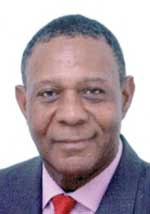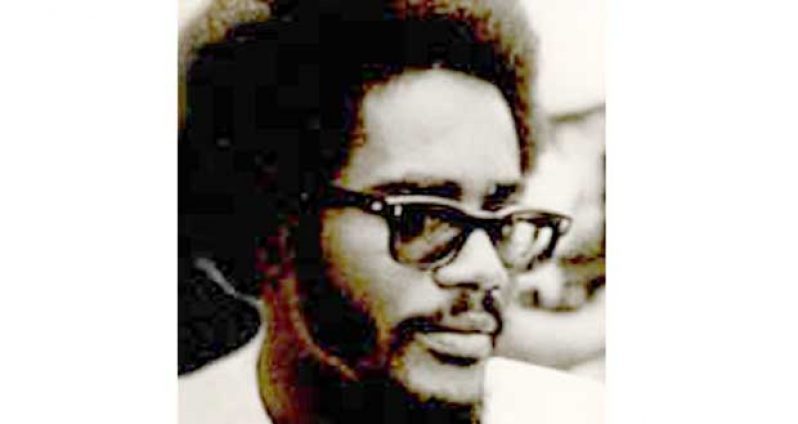RODNEY’S DEATH: AN ENIGMA BEING ANSWERED
Special Report on the Rodney Commission of Inquiry by Shaun Michael Samaroo
WE watch the Walter Rodney Commission unfold in Georgetown with riveting astonishment at the political drama and spectacular tragedy that once bedeviled Guyana, and the quintessential exoticness of our Dr Walter Rodney, a man who rose from humble roots to become a world-class historian, social justice academic, and unforgettable martyr for his people’s democratic freedom.
Dr Rodney was no ordinary man. He rose to commanding heights, stirring the hearts of generations of oppressed peoples everywhere; from his native South America and Caribbean region, to Europe, and especially Africa. He became a voice

for the poor, marginalized and socially-deprived, championing the cause of democratic freedom across the globe.
His legacy leaves a mark unmatched in the annals of world history, and one day, Guyana would hopefully uphold his noble character as the epitome of Guyanese citizenship.
We got a glimpse into the inner private life of the man when his widow, Dr Patricia Rodney, opened a window into their world at the Walter Rodney Commission of Inquiry last week at the High Court in Georgetown.
Ignoring the raucousness of a short-sighted opposition to the work of the distinguished Commission, Mrs Rodney wept as she took to the witness stand to testify about the draconian State pressure that the Government of the People’s National Congress (PNC) unleashed on her family, because her husband dared to speak out against the PNC dictatorship.
Mrs Rodney referred to a young Dr Walter Rodney as a dashing, brilliant Queens College student, whose athletic prowess, academic brilliance and outstanding thinking drew the girls to him: “He was a high-jumper and a great debater; and every girl I knew had a crush on him,” she said in her witness statement to the Commission, a 21-page document that preserves a vital historical record of Guyana’s greatest historian.
Mrs Rodney said she first met the celebrated QC student during a debate that Walter’s team won. “We were introduced once after the famous Darwin Shield debate,” she said. But the memory of that debate remains with her for more than just the reason of meeting her future husband.
For it was at that debate that Walter Rodney out-debated future Guyana leader, Linden Forbes Sampson Burnham, and won the competition. This was the Sixth-Form Queens College team, which Walter led, defeating a Civil Service team that Burnham was leading. It was a big upset. Mrs Rodney said it seems that “Burnham never forgot that debate” that he lost to Walter Rodney.
At 17 years old, Walter and Patricia attended an Old Year’s Night Party. He, a student at the University of the West Indies, and she a teacher at the East Ruimveldt Lutheran School about to head off to London to study nursing.
Ambitious, educated, driven and full of ideal visions of their future as Guyanese, Patricia and Walter enjoyed the party, dancing together and talking. After the party, they chose to walk home rather than ride their bicycles. That night, they walked the five miles to their houses, talking, becoming soul mates and companions.
Their connection never severed after that, until that fateful dark night in Georgetown on Friday, June 13, 1980, when the deafening bomb blast rocked their world, taking Walter’s life, and sending Patricia and their three children into political asylum in Barbados and the United States.
Even while Walter studied at UWI, in Jamaica, and she went off to England to nursing school, they corresponded “regularly”, until Walter moved to London to continue his academic studies. They soon began dating seriously while there, and often met at the London home of famed Caribbean thinker, C L R James and his wife Selma.

“Every Friday night, the home of C L R and Selma James was the usual meeting place for some Caribbean students, including the late Professor Norman Girvan, Richard Small, Orlando Patterson and Margaret Carter-Hope. I would accompany Walter to these gatherings whenever I was off-duty. These political discussions influenced a number of progressive Caribbean scholars,” Patricia told the Commission. On Sunday afternoons, they walked and talked at Hyde Park in London.
Remembering these tender years of the formation of Walter’s thinking, and the unfolding of the great Caribbean leaders who emerged in the decades after the 1960s, Patricia wept in the witness box. Today, the tragedy of Walter’s political

assassination, and the 34-year-old cold case of his death seem a long way from those days of stunning promise, of the dream of creating a Commonwealth Caribbean community built on native-grown English-educated academic scholars and a new ideal for social justice, democratic freedom and economic empowerment to the descendants of slaves, indentured immigrants and oppressed Amerindians.
To witness Dr Patricia Rodney’s heartfelt cry from the witness box at the Commission Friday; to realise she had to travel from her home in the United States where she now lives with the three Rodney children, now grown professionals themselves; to hear her talk of the political asylum the family received after escaping in June 1980 to Barbados after that Camp Street bomb blast, is to watch with utter consternation the failure of the idealism and ambitions and dreams of young Caribbean academics who hung out at C L R James’ London home, and these two gifted souls, who, hand in hand, walked Hyde Park, dreaming of the Guyana the new generation would create.
The sojourns to the Park became more than romantic walks, however, as Walter started stepping on to a speaker’s platform at the Park to talk about the poor of London; about social justice; and about human rights. This social concern became Walter Rodney’s lifelong quest, and would make him a household name in Africa, Europe and across the Caribbean.
After their first child was born and Water received his PhD, the family moved to Tanzania, where Walter taught at a university, and they got involved in African liberation movements.
By now, he had attained an international reputation as a scholar and social activist, carving a niche for himself on the world stage. “This environment was very conducive to the writing of ‘How Europe Underdeveloped Africa’. I can still see Walter sitting at his desk, typing with two fingers on his typewriter, and with our baby son, Shaka, on his lap,” Mrs Rodney said, noting that “In those days, there were no computers.”
After a stint in Jamaica that turned violent when he was banned from entering the country because of his social activism and returned to Canada where he had gone to a conference, the family came through Tanzania to Guyana. “Contrary to unsubstantiated reports, we were never banned or asked to leave Tanzania,” Mrs Rodney said. “We remained friends and colleagues with many leaders in African countries, including the Presidents and Ministers of Government of Angola, Mozambique, Uganda, Tanzania, Zimbabwe, South Africa, and Ghana, to name a few, many of them Walter’s former students from the University of Dar-es-Salaam.”
“Walter accepted the position of Professor/Chair in the Department of History at the University of Guyana. His reasoning for returning home was both professional and personal: He loved his country and wanted to repay the Guyanese working people for their contributions and sacrifices that made his education possible,” Mrs Rodney said, adding:
“Walter and I grew up in Guyana during the 1950s, which was an important period in the development of a nationalist movement working towards independence, and we observed African and Indian Guyanese working together. Walter believed that in the current situation, he could contribute towards healing the racial and class divide that had developed over time. His talents were in his ability to engage people through education for self-development and self-reliance.”
Upon his arrival in Guyana in 1974 from Tanzania, however, Dr Rodney’s employment at UG was revoked. But he chose to stay, nevertheless, insisting that he loved Guyana. “Once he decided to stay and become involved in local politics, including his participation in the Working Peoples Alliance (WPA), the harassment really started,” Mrs Rodney recalled. “We felt that this was due to the large crowds that would gather to hear Walter speak; people from all races and backgrounds would attend. Meetings were broken up; crowds scattered; and our home, our parents’ home, and those of others in the WPA were often searched.”
Even the children were affected, as parents would not allow their children to associate with the Rodney kids. “Walter and I later learned that a parent had been pressured by the government (of the PNC) to end the relationship,” she said, adding: “The children’s piano teacher was told not to allow our daughters to come to her house. The piano teacher told me that she told the men who had approached her that this was her house and they could not tell her who could visit.”
She said that “a number of friends who were civil servants, and frequently attended WPA meetings told us that they were notified that they could lose their jobs if they did not stop. Non-uniformed security personnel were often seen writing down car numbers. After a while, people would park their cars and walk long distances to the meetings to avoid being reported.”
The Police “Death Squad” searched the houses of the Rodneys and their parents “constantly”, with “two to three vehicles, and 10 to 15 persons at a time… We believed our house was bugged; there was a constant clicking sound in the line.”
Mrs Rodney told the distinguished Caribbean legal luminaries comprising Commission Chairman, Sir Richard Cheltenham of Barbados, Senior Counsel Seenath Jairam of Trinidad and Tobago, and Jacqueline Samuels-Brown of Jamaica, “We were often heckled by PNC party supporters whenever they passed our house.”
In an astonishing disclosure, Mr Rodney said, “We were warned that a bomb would be placed in our car.”
Dr Rodney died on Friday, June 13, 1980 in Georgetown, when a bomb exploded in his car as he sat in the driver’s seat with his brother, Donald Rodney, in the passenger seat.
That month, Mrs Rodney and the three children escaped the PNC government and travelled to Barbados, with tickets bought by their friends, Barbadian writer George Lamming and Margaret Carter Hope.
They never returned to live in Guyana, and today, 34 years after the assassination of Dr Rodney, the Commission of Inquiry provides her with the healing and the platform to express her feelings and share her tragic story.
Mrs Rodney appealed directly to President Donald Ramotar to convene the Commission of Inquiry, and the Presidential Commission fulfils a recommendation from the International Committee of Jurists in 1995 for its constitution.
The Commission provides the necessary platform and forum, after 34 years, whereby the outstanding Guyanese social liberator Dr Walter Rodney would be exalted to his rightful place as a noble Guyanese citizen, and his assassination dealt with, including a revelation of the conditions and atmosphere, plots and conspiracies, that existed in his nation at the time of his brutal demise.
PICTURE – FILE PHOTO
1. Dr Patricia Rodney
2. Dr Walter Rodney
3. Commission Chairman Sir Richard Cheltenham
4. President Donald Ramotar
5. Rodney family pix












